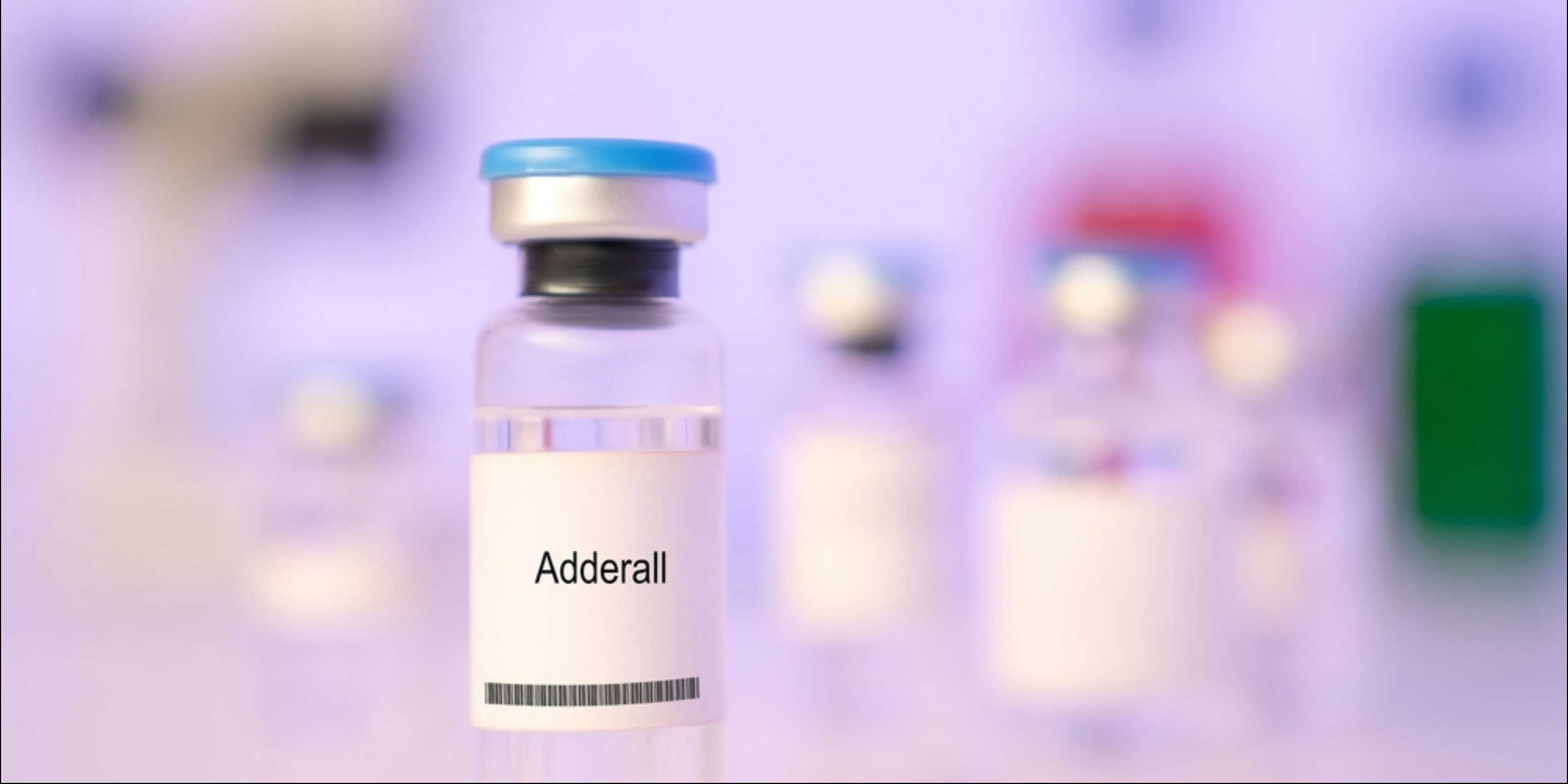Last Updated:
May 16th, 2025
Adderall Addiction | Symptoms, Effects and Causes
For many people around the world, Adderall has become a cornerstone in managing ADHD, helping them lead more organised and peaceful lives. However, Adderall has acquired something of an infamous reputation as it has become commonly abused, particularly among young people. When used as a performance enhancer or in large doses without a prescription, Adderall misuse can quickly escalate into a full-blown addiction. Educating yourself about the dangers of Adderall addiction and understanding how to seek help is vital to avoid the trouble Adderall can cause.

What is Adderall?
Adderall combines amphetamine and dextroamphetamine to create a potent stimulant that greatly enhances your focus and alertness. Doctors typically prescribe it for ADHD, helping those who struggle with concentration and hyperactivity. It is also given to those suffering from narcolepsy, helping to ward off sudden sleep attacks by stimulating alertness. Adderall’s effectiveness stems from its ability to balance key brain chemicals involved in these health issues.
In the UK, however, Adderall is not prescribed due to significant concerns about its potential for abuse and the range of Adderall side effects. These side effects include feelings of being excessively energetic or wired, increased anxiety, insomnia and, as this page will explain, Adderall addiction. These potential issues have led British health authorities to deem the risks of Adderall higher than its medical benefits.
What is Adderall addiction?
Addiction to Adderall develops when the drug shifts from being a helpful tool to a destructive force in your life. Adderall addiction is characterised by a relentless urge to use the medication, even when it is clearly causing you harm.
Starting with a prescription or even just to get through a busy period, you might initially feel that Adderall is exactly what you need. However, this benefit can be fleeting, as many people found when Adderall was still prescribed in the UK. As you continue to use Adderall, your body begins to crave more of it, trapping you in a cycle where you are continually increasing your dosage. This escalating use accumulates high levels of Adderall in your system, pushing you closer to dependency.
Once your brain gets used to operating with these high levels of Adderall, it struggles to manage without it. If you reduce your dosage or attempt to stop, your brain needs time to adjust back to its natural rhythms. This transition period can trigger intense Adderall withdrawal symptoms such as severe anxiety, insomnia and nausea. These distressing effects are often so overwhelming that they can lead to a quick return to taking Adderall to get relief.
But Adderall can quickly entrench itself psychologically as much as physically. It tricks the mind into believing that Adderall is indispensable, overshadowing everything else. This dependency then bleeds into all areas of your life, impairing your health, damaging your relationships and jeopardising your future.
How to spot the warning signs of Adderall addiction
Even when using stimulants like Adderall for valid medical purposes (though Adderall is not prescribed in the UK), it is vital to stay vigilant about the potential for addiction. Early detection can make a significant difference in managing the risk before it becomes more severe. Watch for these Adderall addiction signs and symptoms:
- Noticing that your regular Adderall dose doesn’t provide the same effect anymore.
- Increasing anxiety over obtaining more and more Adderall.
- Frequent arguments with friends or family about your Adderall consumption.
- Experiencing physical symptoms like headaches or emotional symptoms like depression when not using Adderall.
- Skipping or ignoring important activities to use Adderall.
- Deceiving healthcare providers to acquire more Adderall prescriptions (in countries where it is available).
- Continuing to use Adderall despite negative effects on your health and relationships.

It is often recognising these red flags that prompt people to get help for Adderall addiction. If you can relate to any of them, it could be a sign that you need help.
What causes an Adderall addiction?
Adderall can create physical dependency in a very short time frame, posing a risk to anyone who uses it, regardless of their initial intent. However, Adderall addiction risks are not the same for everyone and can be influenced by a variety of individual factors. Key risk factors for Adderall addiction might include:
The mental and physical dangers of Adderall addiction
Adderall addiction and abuse can lead to a range of severe health complications. Key concerns that every Adderall user should be aware of include:
How to overcome Adderall addiction
The road to recovery from stimulant addiction starts under the watchful eyes of medical professionals with a prescription drug detox programme. In this phase, your Adderall dosage is reduced gradually to help your body learn to function without it, softening the impact of withdrawal. You will likely receive additional treatments, too, which are aimed at easing the discomfort of withdrawal, helping you move through this transition more comfortably.
After detox clears your system of Adderall, recovery continues in prescription drug rehab, where you explore the root causes of your addiction. Whether you choose a private facility or a publicly funded NHS programme, rehab is about understanding and healing. Many experts recommend inpatient rehab because it provides a focused, distraction-free environment where you can dedicate yourself completely to recovery.
Where to get help for Adderall addiction
Dealing with Adderall addiction can feel overwhelming, but support is readily available. Through Addiction Helper, you can tap into an extensive network of top-tier rehabilitation centres all across the UK. These centres provide robust Adderall recovery programmes designed to guide you back to health. Contact us today to explore your treatment options and take the first step towards reclaiming your life.
Our compassionate team are ready and available to take your call, and guide you towards lasting the lasting addiction recovery you deserve.
Frequently Asked Questions
(Click here to see works cited)
- UK-Rehab. “Stimulants – Adderall Addiction Information | UK Rehab.” UK-Rehab, https://www.uk-rehab.com/stimulant-addiction/adderall/. Accessed 30 January 2025.
- UK Addiction Treatment Centres. “Adderall addiction | Adderall abuse signs and symptoms | UKAT.” UK Addiction Treatment Centres, 3 January 2024, https://www.ukat.co.uk/addiction/drug/prescription/stimulants/adderall/. Accessed 30 January 2025.
- Jones, Stacey. “Adderall Abuse and Addiction: Symptoms and Warning Signs.” WebMD, 25 August 2022, https://www.webmd.com/mental-health/addiction/adderall-abuse-addiction-signs. Accessed 30 January 2025.
- UK Rehab. “Amphetamine Rehab | Amphetamine Addiction Treatment.” UK Rehab, https://www.uk-rehab.com/drug-rehab/amphetamine/. Accessed 30 January 2025.
- NCBI. “Dextroamphetamine-Amphetamine – StatPearls.” NCBI, https://www.ncbi.nlm.nih.gov/books/NBK507808/. Accessed 30 January 2025.
- Patterson, Eric. “Adderall Abuse | Signs, Symptoms, and Addiction Treatment.” DrugAbuse.com, 2 May 2023, https://drugabuse.com/stimulants/adderall/. Accessed 30 January 2025.

